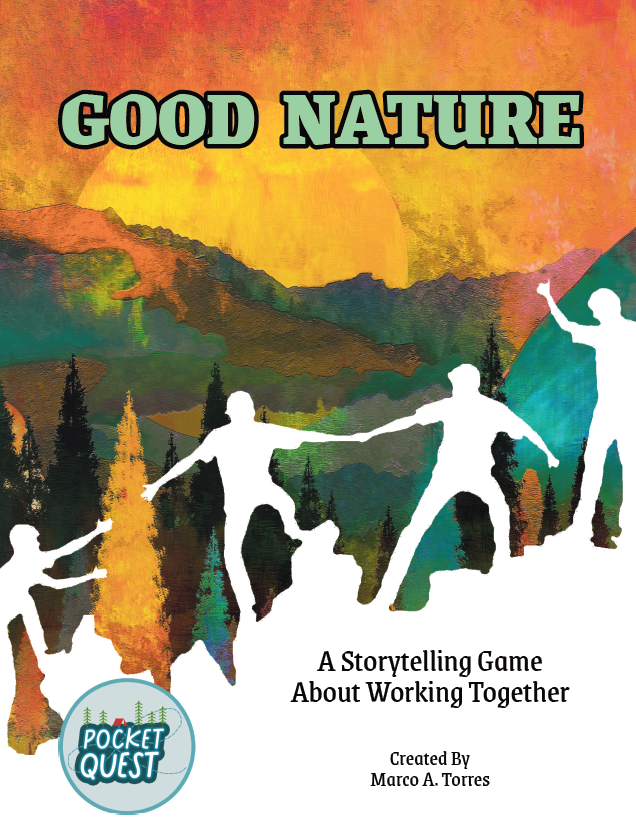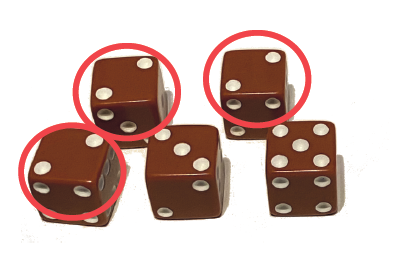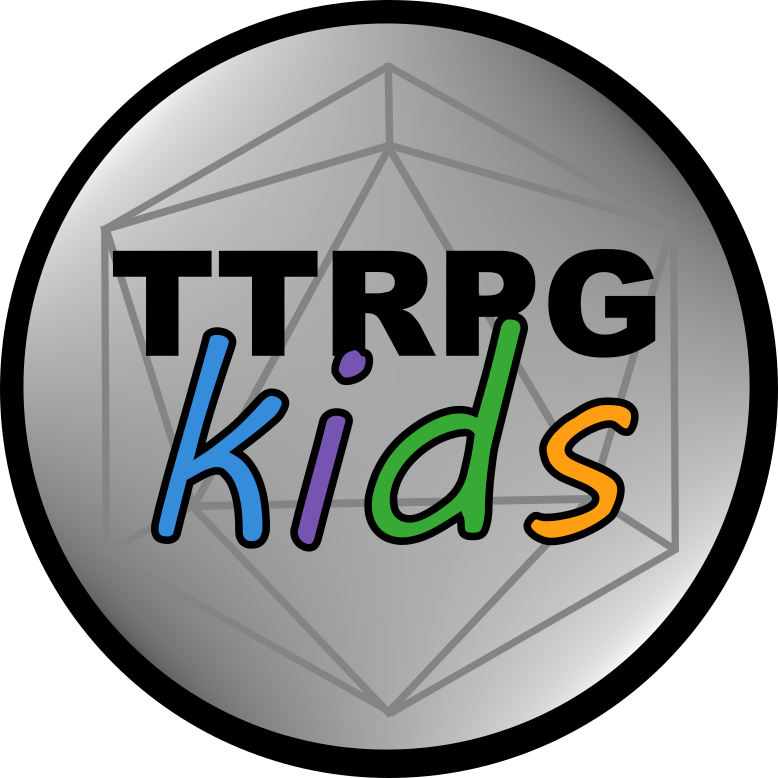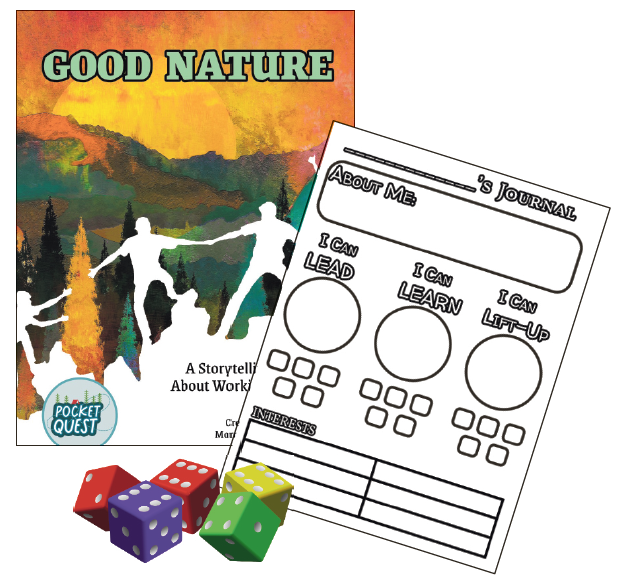Review of Good Nature – a collaborative journaling tabletop RPG!
Note: This post may contain affiliate links. At no additional cost to you, I may earn a small commission from purchases made using them. TTRPGkids uses this to keep the site going. Read full disclosure here.
Jump to:
Special discount! For as long as the sale lasts, Good Nature has physical copies at 50% off using this link here on DriveThruRPG!
Good Nature is made for all ages (writing required)

Good Nature is a collaborative journaling game that is intended for kids to play and learn with. The pre-made settings and the mechanics are all geared at being appropriate for all ages. Resolution of situations is all focused on social-emotional skills, so there’s no combat involved.
Good Nature highlights several Common Core Anchor Standards for English Language Arts and Mathematical Practices for K-12 and promotes practicing storytelling, writing, and quantitative reasoning skills that kids will use in schools.
For my kid, he is 4 years old, and the only adjustment we made was that I helped him with writing out his recap of events. The mechanics and prompts were all understandable and usable, so it fits well with the all ages denotation.
Good Nature’s adjustable school-focused setting
Since Good Nature is a system, the setting can vary to however you want – you can set it in school-based situations or expand from there (in the game with my kid, he wanted to play out a camping trip with Grandma). Several of the suggestions lean towards school or camp based activities (science camp, school events, etc) that would fit well in using this with school kids and giving a way to connect with the material through known references.
Creating your Good Nature’d character!
First, the character sheet for Good Nature is clear, uses pictures, and focuses on giving writing space and areas to easily track stats (using squares to fill in versus numbers). The pictures used are relevant and clear, and, after the first explanation, my kid was able to follow along with the stats without help. This was a great character sheet for being able to track stats and character information without creating clutter or confusion.
Second, your character is defined by three stats that focus on some awesome skills. There’s Lead, Learn, and Lift-up as your 3-L verbs to use for resolving scenarios. You choose the ratio of how to divide your points up between the 3-L verbs, and those form the core for your character’s abilities. You also choose two interests (like a favorite school subject or a hobby) for your character as well, and these can help with difficult challenges later.
A unique combination of dice, journaling, and leveling in Good Nature
Collaborative dice mechanics
I really liked the dice mechanics used in Good Natured because they were simple but very effective at actively promoting teamwork. You roll dice based on the points you have in the 3-L verb you’re using for this task PLUS dice based on 3-L verbs from your teammates who are helping you and maybe a bonus if your character’s interest is involved.
Then, instead of adding up all the dice to some big number, you are trying to get them to match (i.e. all 2’s, all 4’s, ect), kind of like in Yahtzee. Your goal is to try to get the number of matches assigned by the difficulty level.

For my kid, this was great – it allowed randomization, promoted teamwork to combo up rolls, kept the math to a minimum while still practicing number recognition, and let us roll satisfying handfuls of dice.
Journaling in Good Nature
In Good Nature, when a situation is completed, the leading player fills out a journal entry to reflect on what happened! They detail what the situation was, who helped, and where the group GLOWed (succeeded) or could GROW (if they did not succeed). There’s a few prompts to ask what happened, how it felt, and what could have been done differently for a quick few sentences of writing.
With my kid, I did need to help with the actual writing part since he isn’t quite there yet, but he came up with great answers to the questions and was excited to be asked what he thought after it was completed. He gave great summaries of the events and was proud of his successes. For kids who are looking for motivation to write, I can see this being an excellent way to start and practice – it always helps to write when you’re passionate or invested in the subject.
Leveling up in Good Nature
I really enjoyed Good Nature’s leveling mechanics too – you level up by earning badges instead of through XP. When you complete a situation, you earn badges based on how it was completed (GLOW or GROW) and who in your team helped you with it.
To level up, you need to have enough badges in that 3-L verb to exceed the current 3-L verb level, and then you can trade in those badges to permanently increase that 3-L verb level! I thought this was a clever way to incentivise players practicing skills that their character isn’t always super strong with, and it creates a bit of a leveling curve so leveling naturally slows down the higher the level becomes.

You also can choose to trade badges for adding interests as well, so there’s a bit of a decision-making process involved with… do I level my 3-L verbs to get that extra die? Or do I increase my interests in the hopes that it will match the next task and I can get an automatic success die? This mechanic gives opportunities for making your character grow in a unique way and allowing players a bit of strategy, if they want it.
What did my kid think about Good Nature
My kid decided he wanted to play out a camping trip with grandma (help her on a walk, collecting firewood and putting out the campfire at night, cleaning up the campsite before leaving, etc), and this worked so well. He liked counting out the dice matches, especially since we had been practicing playing yahtzee previously, and he liked having mechanics that he could track and use.
My kid also really liked the journaling elements of this RPG. He can’t read or write yet, so I transcribed what he was saying, but other than that, it was all him. He recapped everything (sometimes with embellishments) and was very enthusiastic to talk about how he felt about the situations and why he did what he did.
Overall thoughts on Good Nature
Good Nature was a fun game to share with my kid, and I appreciated the attention to the Common Core Anchor Standards being fluidly applied within the game – it didn’t feel heavy handed, they were just part of the game. Good Nature got my kid talking about the story he played, which is a great win from a communication skills standpoint, and he was excited to do it. Good Nature also had great tracking sheets for adventure (I make my own tracking sheets a lot of times, so it was REALLY nice to have some ready-made ones) and was very clear to follow.
I had fun playing Good Nature with my kid, it’s educational, it’s quick to pick up, and I could definitely see it being an awesome tabletop RPG addition to a classroom or camp curriculum!
Find a copy of Good Nature!
Find a copy of Good Nature on driveThru RPG!

This game was a lot of fun, and I hope you get the chance to check it out! If you do, please let me know in the comments below what your thoughts are!
If you liked this post, make sure to subscribe to the TTRPGkids monthly newsletter to stay up to date on the latest reviews, tips and tricks, game and podcast list updates, and more! Thank you for playing tabletop RPGs with your kids and sharing this awesome hobby with the next generation!


This game is exactly what kids of today need. An interest in Role Playing Games (RPG) is on the rise amongst kids. I see so many kids feel much more free to express feelings and emotions that they otherwise wouldn’t be able too. They have the ability and feel ok to try different social actions that they otherwise would be able too. To have a game that the family can play and parents have that ability to reinforce or to teach is priceless!
I could not agree more! RPG’s are so helpful to kids (and to grown ups too) as a way of being able to express more, try out different ways of handling situations, and connect.